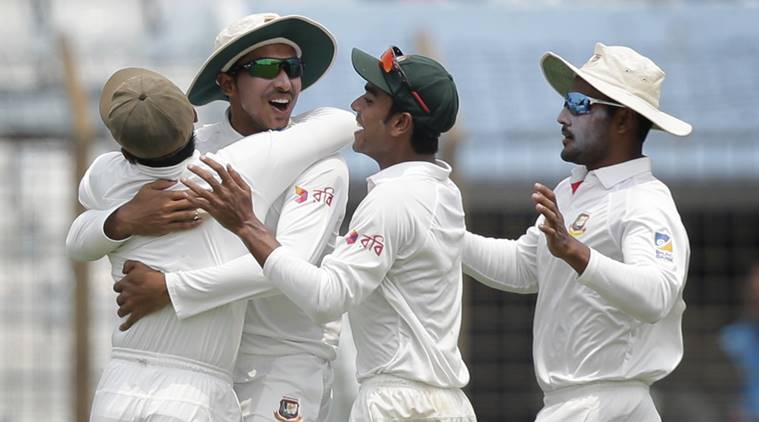 Bangladesh and Australia played out a 1-1 Test series draw in 2017. (Source: AP)
Bangladesh and Australia played out a 1-1 Test series draw in 2017. (Source: AP)
Bangladesh’s first Test victory over Australia in Dhaka last year was belittled by Cricket Australia’s team performance chief Pat Howard as something that was achieved by players who were not up to standards to play for Australia’s state teams, a new book has revealed.
The two-match series came in the aftermath of the pay dispute with the board. An underprepared team then lost narrowly to Bangladesh on a sharply turning surface and were attacked by sections of the media. In Gideon Haigh’s ‘Crossing The Line’, it also contains an account of the build-up to this year’s ball-tampering scandal. Following the defeat, Howard had sent a strongly worded email to senior figures in Australian cricket.
“I am sitting in a cafe in Dhaka hotel at the conclusion of the first Test loss ever to Bangladesh. I am personally embarrassed and take accountability and happy to accept any criticism that comes our way,” Howard wrote says a report in ESPNCricinfo. “For some of you sitting here in Dhaka you are fully aware of how poor a result this is and you have a material opportunity to address in the next few days.
“Rightly the system is often judged on the outcomes of the national team. As you can imagine there are many questions being asked of us, and I think they are fair. I am reasonably confident that many of the players that have just beaten us would not get a run in any of the state teams.
“To the CA Team Performance – When you go home at the end of the day, does what you do actually make a difference? CA spends over $100m on players’ wages and teams, all in the effort of producing great national teams. We have failed, you have failed and I have failed and it is not good enough.”
The book further highlights the way Australia bounced back to win the second Test and ensure a levelled series. It was followed by Australia’s hosting of Bangladesh getting cancelled for larger commercial reasons.
Reflecting on the Australia’s ODI showing which has grown over the years, the book suggests it as a set of individuals at play than a team. “A player summed up the one-day side in a word: ‘Individuals’. There were no basics, no planning. You got together in the morning, went your separate ways at night. It never felt like an Australian ‘team’ in any sense of the word.”
“Another player felt that Lehmann had fallen into this coaching fashion simply through running short of things to say: ‘I love Boof. He’s got a great heart and he loves the players. But, really, he hardly coached technique at all. ‘You’re struggling? Just whack it.’ ‘You’re going for runs? Just bowl yorkers.’ ‘We’ll smash them.’ He really just had no other answers but to try and build up this arrogance.'”